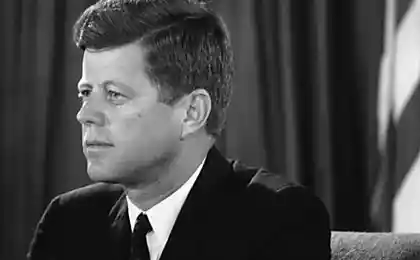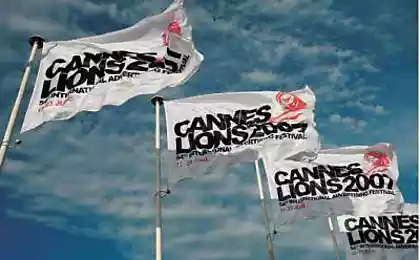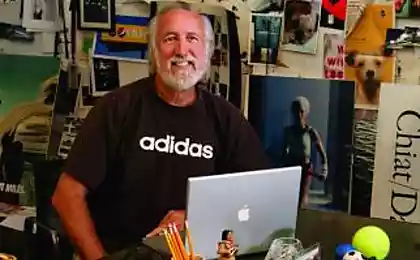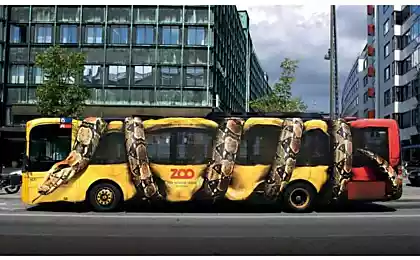1558
Two days in the Wieden + Kennedy Amsterdam
Project Site "Two days in the agency 'returns. And he returned with a unique material about the agency Wieden + Kennedy Amsterdam, where he spent two days of November the site editor Xenia Lukicheva.Vy understand that we could not take advantage of the presence of "our people" in one of the coolest agencies of the world. Eugene Primachenko, copywriter Yekaterinburg Sunrise, about a year ago, received an offer to join the team Wieden + Kennedy in February and moved to Amsterdam. And in November, when Eugene was quite settled into one of the largest independent agencies in the world, we went to visit him.
Serious differences in the workflow, "they" and "we" became apparent a week before the trip, when the PR-service Weiden sent me to schedule a visit: welcome-tour interview, lunch and free time were designated per minute, and Eugene separately He stipulated that this is not indicative timetable, and the need to really follow it. Usually two days in the Russian agencies are in the spirit of "well, let's see who we are now free».
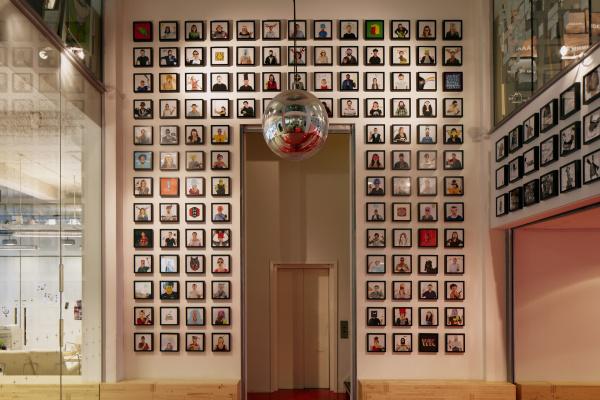
In Amsterdam, I arrived on the eve of the day when I had carefully stowed in the schedule, and immediately got on the informal event. The team Wieden + Kennedy to gather in one of the many bars to hold two colleagues, leaving the agency. Edakii adaptation evening - remember all their modest English, to meet people, to begin to understand that here, and how.
David Ogilvy, as is well known to all advertisers on their books are not just talking about the fact that the client does not need to love declaratively, and sincerely treat it jealously and make sure the product is the consumer. In our reality somehow assumed that it is utopian, we generally do not apply to, and Weiden is soldered into the DNA of employees. Before we Zhenya went to the bar, he told me that since accidentally happened that he works in Weiden, which caters for Nike since its foundation, and his housemate - at Sid Lee, the agency a few years ago to obtain a global contract Adidas. And then I looked at his feet and nodded when he saw a huge Swoosh on-blue Air Max. "Not that it was critical, but we like Nike, you understand».
The bar hit me all the accents in the world and an understanding of what is truly an international agency. Of the approximately 130 people who work in the Weiden at the moment, only about twenty - the Dutch, the rest - expats from around the world. UK, USA, New Zealand, France, Germany, Italy, Portugal, Romania, Russia and so on. Therefore, the agency for the English - language is not official correspondence as in the Russian network agencies, and the language spoken by all and always. This is not the construction of the Tower of Babel, but a serious business, it should be very clear.
Is there in an informal setting among those who make the best advertising in the world, it was joyful and exciting. Primachenko introduced me to everyone, to whom he could reach, telling beforehand who is who by adding the name and position of a little history of achievements: the coolest campaign international awards. And all of these superstars of world advertising were equally welcoming, open and happy to talk and laugh on "journalist among us, it is dangerous».
One of the unwritten laws of Wieden + Kennedy, which should be strictly adhered to by all, from the managing director to the employees welcome-desk, repeating the words of the founder of the agency, said it many years ago the girl at the reception: "Treat everyone equally." And there is. What's a party at the bar during the working day.
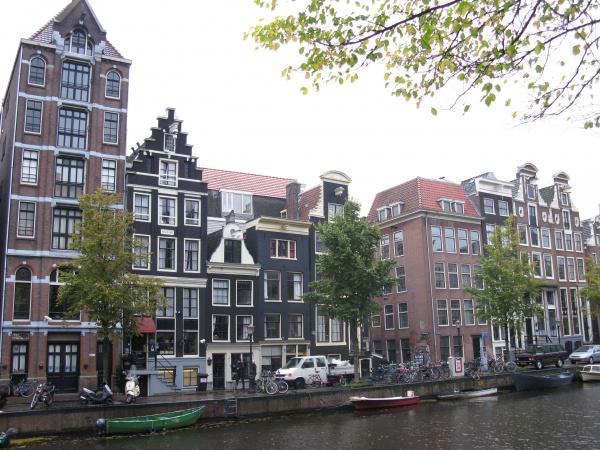
Office Wieden + Kennedy Amsterdam is located in the city center, in an old canal house Herengracht. At the high porch of a modest plaque on the presence of a number which begins noticeably miss a beat inside. I click on the call button and a huge old wooden door opens slowly - I Weiden. No transmission system, there is no pre-recording - can come, anyone. You just need to say to someone you've come to meet you.
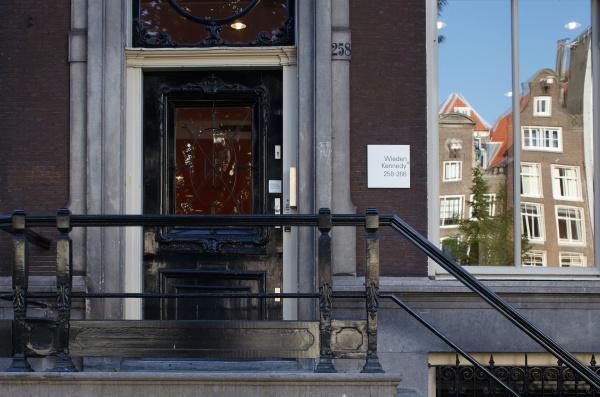
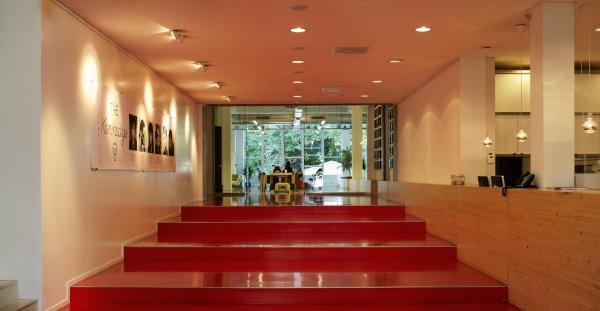
I met Eugene and Andrea, PR-manager agency that conducts me a tour of the huge office. Workspaces, cluttered desks and littered with books, interspersed with areas ... wanted to say "rest", but this is not true. Most areas in which people of Weiden think, discuss, solve problems. In peregovorkah deliberately unrestored vintage chairs, painted in black. Agency point of pride - an impressive library, collected in the so-called zone of Mad Men, where they tried to recreate the atmosphere 60s. In secluded corners - small "room of silence" where you can talk on the phone away from the hustle and extra listeners. Multi-million dollar global contracts oblige to preserve diverse information secret. The ground floor kitchen, dining room - there are corporate events and parties, if you do not need or do not want to go outside. For example, on the eve of my arrival there to celebrate Halloween. From the dining room access to a hell of a cozy patio, he's smoking room, he is parking for bicycles, it is the place of summer parties.
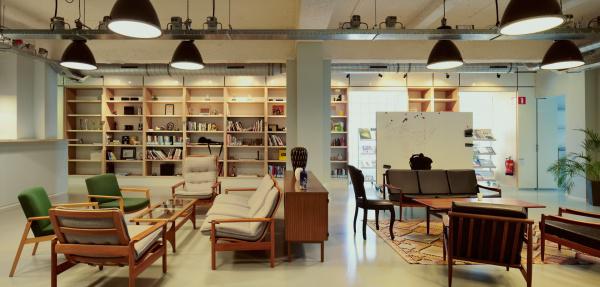
Mad Men Area em>
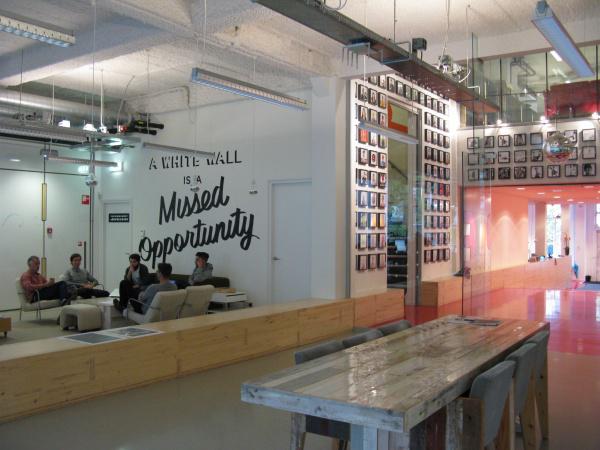
A white wall - a missed opportunity em>
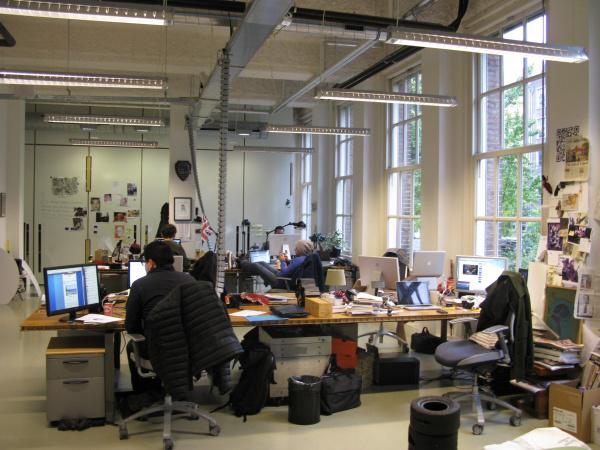
The working environment em>
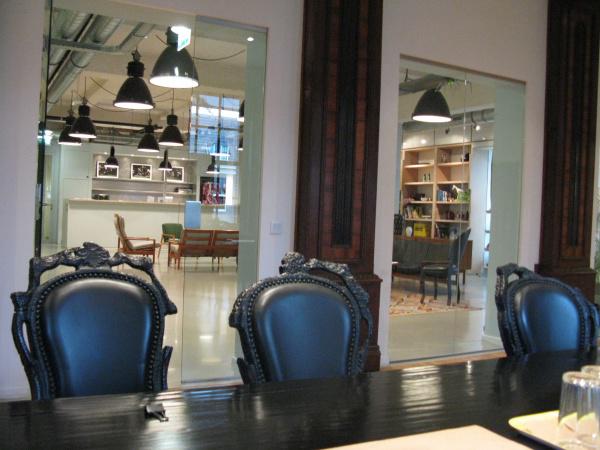
Meeting Room em>
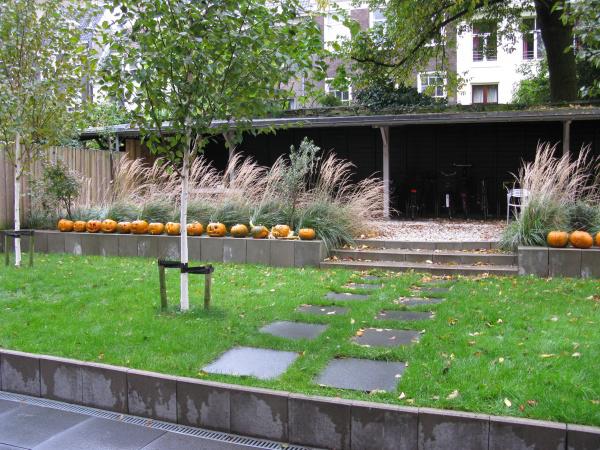
Patio em>
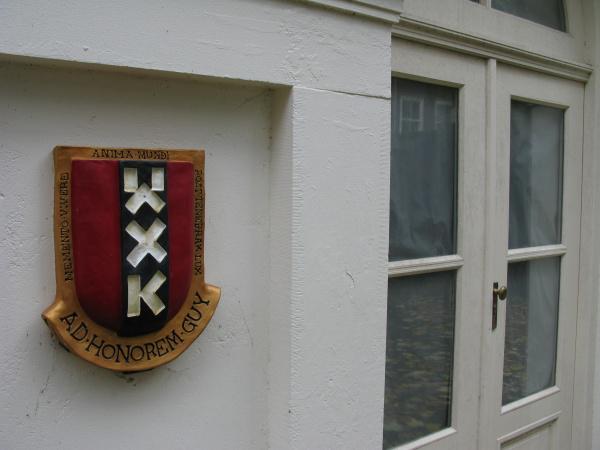
The coat of arms of Amsterdam on the Weiden-style em>
Throughout the agency here, there are arranged, laid out and even scattered awards. "Iconostasis" in Weiden is not - this is very significant in terms of how they relate to the festivals and competitions. No worship and piety, no race, just an extra nice bonus to excellent work done. About the awards, fake and respect to all this, we then spoke with Thierry and Fostenom, creative director at Heineken, and in the meantime freed on a smoke break Jack urges me to go to the toilets, to assess the agency's self-irony in relation to awards. Glass display cases with figurines are obtained only in the bathrooms and in the workspace they suddenly come across. For example, you begin to sort logs piled a heap on the ground floor of a low shelf: Luerzer's, AdAge, Adweek, oh, Cannes Silver Lion, another edition of Adweek. In the area of Mad Men are four "tick" Evrobesta diluted by a malicious ceramic dove and books backs another lion.
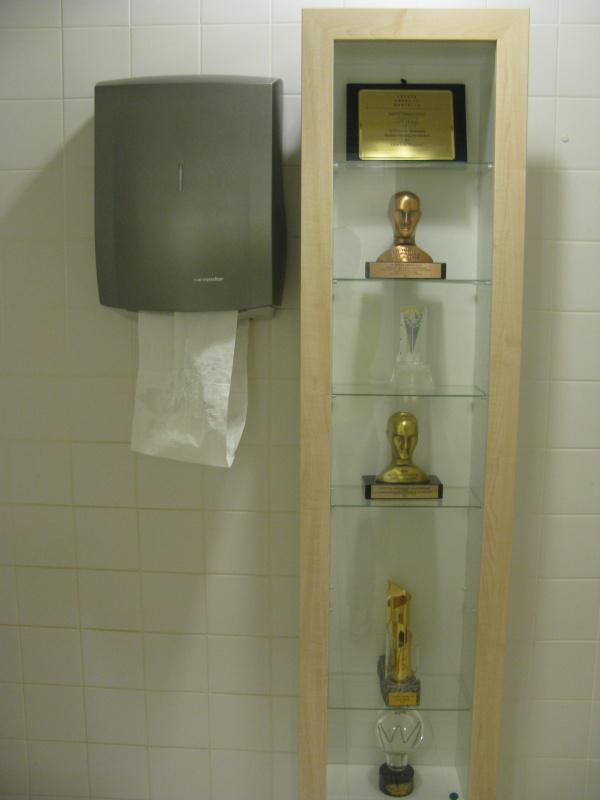
And so in every closet em>
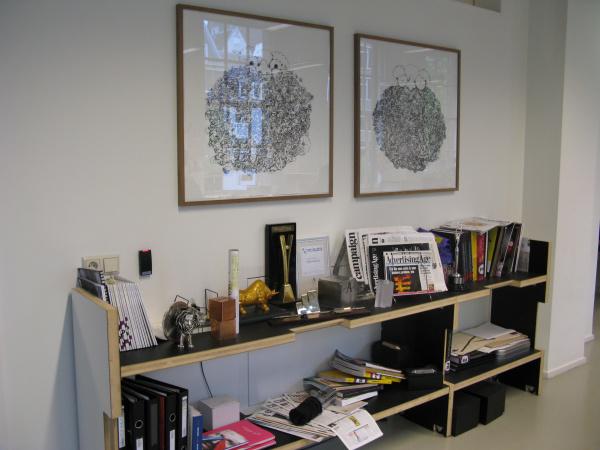
The Lions just lying em>
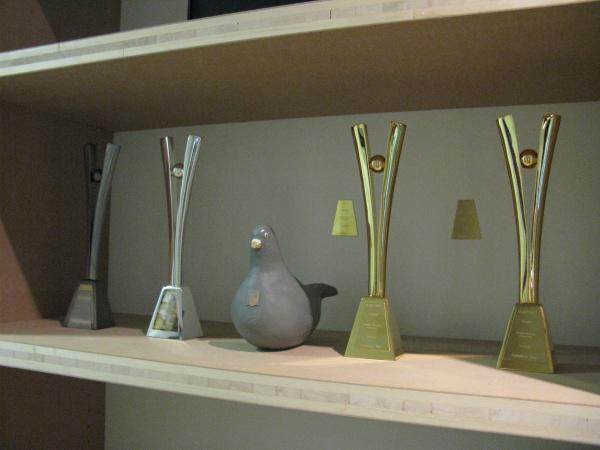
Dove guard em>
After visiting the Agency has an interview. And in terms of understanding how the agency operates, what it lives, it refers to the fact that doing this was quite an unforgettable experience that I hope to share with you. No stories of the journalist will not give you the same, saying that the direct participants of the process of creating advertising, which equals.
Burning eyes, sensitivity, respect for all and all - to work, to colleagues, to customers, to the audience. And reinforced calm. I asked Jenny whether there are employees Weiden explosions nerves when "Ahh! All the freaks, and it goes all the dancing! ". Jack thought for a moment and admitted that sometimes, but very rarely and only in the units.
Martin Weigel, head of planningPervaya meeting was scheduled with Martin Weigel, whose global advertising community almost unanimously recognized as one of the best strategists in the world. His infinite respect and Wieden + Kennedy, exhaling, "Oh! Martin ... He is wise, he is so cool, you're so lucky ».
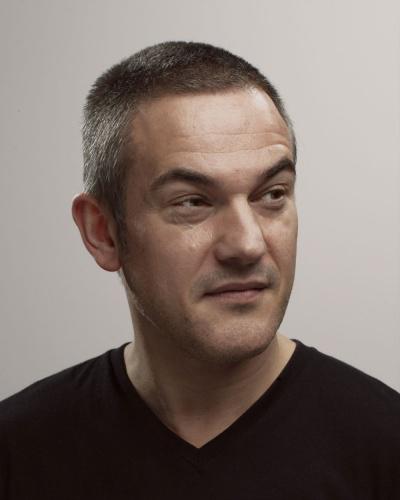
- Hi, Martin.
- Hello, Xenia.
- The Russian advertising is that there is some confusion with an understanding of the essence of the strategy, how it works and all that. Please tell us about how it works here.
- I think that the strategy works the same everywhere in any company, not only in the advertising agencies, "where are we?", "Where we want to go?", "Why do we want to go there?", "How should we come to it?" "how easy it is?". These issues - the heart of any strategy. And every day there is a little bit our strategy, you know, yes?
For example, if you have a big meeting with a client, you think "I need to look professional and impressive" - this is where you want to be. And how and why - is "okay, I need to wash my hair, because I realize that I'm a big boy and I need to look a little more mature." It is clear that this is a simplification, but nevertheless: who among us does not deal with strategic planning? And I think that in advertising exactly the same thing.
But I call myself Planners, and not a strategy.
- What's the difference?
- Yes, anything, in general. Just one man came up 50 years ago to enter into the structure of the agency strategists and called them "Planners," so that I, too, call them "Planners". For me this link with the origins. (laughs) em>
And returning to the understanding of strategic planning. What we are doing is not just creative, but that will work in the market. It is not enough just to have the imagination and give him freedom. Whatever we do, we are engaged in one - we bring understanding of the outside world in the creative. How do people go shopping, how to buy, what they think, what motivates them. Understanding consumers' understanding of their relationship with brands, as people involved in the communication, how they use technology, and finally, understanding the culture in which there is advertising.
We are trying to understand the world in which we operate, and bring it all into the development process, we understand what is the relationship of the brand and the consumer today, what we want to become in the future, how far we need to go, what we need are pieces and passages to get people interested.
And my work begins with how the world works, which should appear in advertising. It's not just, "Hey, this is good!" Planners should start with the unknown (laughs) em>, and then ... use the imagination.
- It turns out that you have to know everything about everything?
- Yeah. Maybe it sounds really cool and important, but the work of Planners is to bring this knowledge to the development of the strategy. We are not just the researchers, because we use the imagination, whereas the study - is to provide objective data. We have something like connector with the real world. So if we do not have in the agency, the work is not real work. And if you know who the consumer what he thinks about the brand, why he does not buy it now; If you have thought about what people say or do, it can change things, and the agency will work successfully. Well? Clarify? (laughs) em>
- It is.
- It was a long answer to a short question.
- A long and steep. Look, some advertisers claim that marketing is dead. Do you agree?
- Mmmm ... Not who I hate more than the people who write these obituaries. It throws me into a rage. Because people rarely say this for good reason. They say that advertising is dead, died marketing, TV is dead, anything, has died. As journalists, who need a good headline, because he catches sight, you know what they say ... usually those who need publicity, or those who need something you sell. Television is dead, instead buy another marketing is dead, buy ... well, bullshit! What is marketing? This invention of products that people need, affordable and exciting products. But such statements - is the easiest way to make a noise a bit. It's as if you were standing on the corner of the street and yelling. "Yeah, provocative point of view» (intonation depicts people who hear it) em>. This is not serious, and the industry is rarely interested in this.
- Now in communication was more emotion than, say, 10 years ago?
- Mankind is basically driven by emotions. The human brain, behavior, motivation is mainly controlled by unconscious thoughts, intuitive thinking. There is an excellent book by Daniel Kahneman "Think fast, think slow." Kahneman won the Nobel Prize for his work on understanding how people make decisions. And this book tells the story of how often we think we made a rational choice, but in reality it is an emotional or unconscious. It is quite important for marketing, because it is fused into our DNA is fused to the human race - to be emotional. Marketing, which belongs to you and I as rational people interested in rational arguments and did not think about the fundamental motivation, he denies what it means to be human, and therefore not succeed. I think it's really cool marketing has always understood this, sometimes unconsciously, sometimes consciously, but always had a liking for what it means to be human.
Great advertisers know how important emotional component. If you look at advertising that goes 20, 30, 40 years ago, it is clear that they did not understand how the human brain works, but I understand that the audience emotional.
I do not know whether the emotion was more or less, but I do know this. Our market is full of bad publicity, which suggests that people are waiting for the messages of advertising works with the promise of a rational, verbal concepts placed in the brain, they have two weeks to remember the supermarket. Advertising often ignores what it means to be human, and it is very alarming.
For many people, it must be re - emotion in marketing - but the emotion is what drives humanity. This is not a new phenomenon, it seems that marketing is just slow understands people.
- All people are different. How did you find them in common? In the whole target group?
- Good question. You know, every market participant has a choice: you can search for commonalities that exist in people, and to find them, or you can look for things that make people different, and also to find them.
A great example - Heineken. If you look at a man drinking beer, say ... in London, and a man drinking beer, for example, in Hanover, it is clear that it is quite different people. Bottles will look different, how they drink, social atmosphere, the amount drunk.
Developing case Heineken, we found a lot of things that make people different. Our client wanted a unified global campaign, a creative platform that could work everywhere. So we were looking for and the differences and what unites people in general. It would seem that You are looking for something fundamental to humanity, but humanity - is a mess of emotions, so?
- Something like that. Looking for a common core.
- There is something in common everywhere, in all cultures. We all want more, we want to be better than our neighbor. History, culture - everything is based on that. And if you look "under", as you said, a common core, we find traits that every person.
And I think that Heineken has really grown as a brand after it was found that common fundamental thing. It's all very simple ... is not there some kind of complex integrated and highly intellectual thoughts. It is, as we say, more than a basic human truth. When a man in his early twenties, he had to come all this long journey of life, but he does not want to look as if he did not know what to do. He wants to look like a guy who understands the world, knows which way to go at it, sure of himself, the situation resolves the situation and is doing everything so that it looks easy. We all remember, as they wanted to be that guy. The guy who looks privileged, the guy who walks into a bar and there should not pay. And it is - the truth in any country, in any culture, it is the basic thing.
- It is hard to find such insights ... cool?
- (thoughtfully) em> should not be difficult, it should not. Because when you are looking for these things, you ask a question: what it means to be human? But finding the right insight to the right brand is difficult. Even if you find the largest human truth, you're still only at the beginning of their strategy, because you have to know and be sure that you're going to do with it. You can not just go and put this truth into the rotation on TV. You can not just show up with her before the camera, without transforming it into something exciting and interesting.
- That is the strategy should feel the people.
- Yes, understanding the psychology of people - an essential part of our work. And I must not only understand the psychology of people, but also to know the brands psychiatry (laughs) em>. Imagine a brand comes to the doctor's office: "I feel small and inadequate, I want to be big and strong» (laughs) em>. And I have to put the brand better diagnosis than do consumers.
How does this happen?
Do you understand?
Serious differences in the workflow, "they" and "we" became apparent a week before the trip, when the PR-service Weiden sent me to schedule a visit: welcome-tour interview, lunch and free time were designated per minute, and Eugene separately He stipulated that this is not indicative timetable, and the need to really follow it. Usually two days in the Russian agencies are in the spirit of "well, let's see who we are now free».

In Amsterdam, I arrived on the eve of the day when I had carefully stowed in the schedule, and immediately got on the informal event. The team Wieden + Kennedy to gather in one of the many bars to hold two colleagues, leaving the agency. Edakii adaptation evening - remember all their modest English, to meet people, to begin to understand that here, and how.
David Ogilvy, as is well known to all advertisers on their books are not just talking about the fact that the client does not need to love declaratively, and sincerely treat it jealously and make sure the product is the consumer. In our reality somehow assumed that it is utopian, we generally do not apply to, and Weiden is soldered into the DNA of employees. Before we Zhenya went to the bar, he told me that since accidentally happened that he works in Weiden, which caters for Nike since its foundation, and his housemate - at Sid Lee, the agency a few years ago to obtain a global contract Adidas. And then I looked at his feet and nodded when he saw a huge Swoosh on-blue Air Max. "Not that it was critical, but we like Nike, you understand».
The bar hit me all the accents in the world and an understanding of what is truly an international agency. Of the approximately 130 people who work in the Weiden at the moment, only about twenty - the Dutch, the rest - expats from around the world. UK, USA, New Zealand, France, Germany, Italy, Portugal, Romania, Russia and so on. Therefore, the agency for the English - language is not official correspondence as in the Russian network agencies, and the language spoken by all and always. This is not the construction of the Tower of Babel, but a serious business, it should be very clear.
Is there in an informal setting among those who make the best advertising in the world, it was joyful and exciting. Primachenko introduced me to everyone, to whom he could reach, telling beforehand who is who by adding the name and position of a little history of achievements: the coolest campaign international awards. And all of these superstars of world advertising were equally welcoming, open and happy to talk and laugh on "journalist among us, it is dangerous».
One of the unwritten laws of Wieden + Kennedy, which should be strictly adhered to by all, from the managing director to the employees welcome-desk, repeating the words of the founder of the agency, said it many years ago the girl at the reception: "Treat everyone equally." And there is. What's a party at the bar during the working day.

Office Wieden + Kennedy Amsterdam is located in the city center, in an old canal house Herengracht. At the high porch of a modest plaque on the presence of a number which begins noticeably miss a beat inside. I click on the call button and a huge old wooden door opens slowly - I Weiden. No transmission system, there is no pre-recording - can come, anyone. You just need to say to someone you've come to meet you.


I met Eugene and Andrea, PR-manager agency that conducts me a tour of the huge office. Workspaces, cluttered desks and littered with books, interspersed with areas ... wanted to say "rest", but this is not true. Most areas in which people of Weiden think, discuss, solve problems. In peregovorkah deliberately unrestored vintage chairs, painted in black. Agency point of pride - an impressive library, collected in the so-called zone of Mad Men, where they tried to recreate the atmosphere 60s. In secluded corners - small "room of silence" where you can talk on the phone away from the hustle and extra listeners. Multi-million dollar global contracts oblige to preserve diverse information secret. The ground floor kitchen, dining room - there are corporate events and parties, if you do not need or do not want to go outside. For example, on the eve of my arrival there to celebrate Halloween. From the dining room access to a hell of a cozy patio, he's smoking room, he is parking for bicycles, it is the place of summer parties.

Mad Men Area em>

A white wall - a missed opportunity em>

The working environment em>

Meeting Room em>

Patio em>

The coat of arms of Amsterdam on the Weiden-style em>
Throughout the agency here, there are arranged, laid out and even scattered awards. "Iconostasis" in Weiden is not - this is very significant in terms of how they relate to the festivals and competitions. No worship and piety, no race, just an extra nice bonus to excellent work done. About the awards, fake and respect to all this, we then spoke with Thierry and Fostenom, creative director at Heineken, and in the meantime freed on a smoke break Jack urges me to go to the toilets, to assess the agency's self-irony in relation to awards. Glass display cases with figurines are obtained only in the bathrooms and in the workspace they suddenly come across. For example, you begin to sort logs piled a heap on the ground floor of a low shelf: Luerzer's, AdAge, Adweek, oh, Cannes Silver Lion, another edition of Adweek. In the area of Mad Men are four "tick" Evrobesta diluted by a malicious ceramic dove and books backs another lion.

And so in every closet em>

The Lions just lying em>

Dove guard em>
After visiting the Agency has an interview. And in terms of understanding how the agency operates, what it lives, it refers to the fact that doing this was quite an unforgettable experience that I hope to share with you. No stories of the journalist will not give you the same, saying that the direct participants of the process of creating advertising, which equals.
Burning eyes, sensitivity, respect for all and all - to work, to colleagues, to customers, to the audience. And reinforced calm. I asked Jenny whether there are employees Weiden explosions nerves when "Ahh! All the freaks, and it goes all the dancing! ". Jack thought for a moment and admitted that sometimes, but very rarely and only in the units.
Martin Weigel, head of planningPervaya meeting was scheduled with Martin Weigel, whose global advertising community almost unanimously recognized as one of the best strategists in the world. His infinite respect and Wieden + Kennedy, exhaling, "Oh! Martin ... He is wise, he is so cool, you're so lucky ».

- Hi, Martin.
- Hello, Xenia.
- The Russian advertising is that there is some confusion with an understanding of the essence of the strategy, how it works and all that. Please tell us about how it works here.
- I think that the strategy works the same everywhere in any company, not only in the advertising agencies, "where are we?", "Where we want to go?", "Why do we want to go there?", "How should we come to it?" "how easy it is?". These issues - the heart of any strategy. And every day there is a little bit our strategy, you know, yes?
For example, if you have a big meeting with a client, you think "I need to look professional and impressive" - this is where you want to be. And how and why - is "okay, I need to wash my hair, because I realize that I'm a big boy and I need to look a little more mature." It is clear that this is a simplification, but nevertheless: who among us does not deal with strategic planning? And I think that in advertising exactly the same thing.
But I call myself Planners, and not a strategy.
- What's the difference?
- Yes, anything, in general. Just one man came up 50 years ago to enter into the structure of the agency strategists and called them "Planners," so that I, too, call them "Planners". For me this link with the origins. (laughs) em>
And returning to the understanding of strategic planning. What we are doing is not just creative, but that will work in the market. It is not enough just to have the imagination and give him freedom. Whatever we do, we are engaged in one - we bring understanding of the outside world in the creative. How do people go shopping, how to buy, what they think, what motivates them. Understanding consumers' understanding of their relationship with brands, as people involved in the communication, how they use technology, and finally, understanding the culture in which there is advertising.
We are trying to understand the world in which we operate, and bring it all into the development process, we understand what is the relationship of the brand and the consumer today, what we want to become in the future, how far we need to go, what we need are pieces and passages to get people interested.
And my work begins with how the world works, which should appear in advertising. It's not just, "Hey, this is good!" Planners should start with the unknown (laughs) em>, and then ... use the imagination.
- It turns out that you have to know everything about everything?
- Yeah. Maybe it sounds really cool and important, but the work of Planners is to bring this knowledge to the development of the strategy. We are not just the researchers, because we use the imagination, whereas the study - is to provide objective data. We have something like connector with the real world. So if we do not have in the agency, the work is not real work. And if you know who the consumer what he thinks about the brand, why he does not buy it now; If you have thought about what people say or do, it can change things, and the agency will work successfully. Well? Clarify? (laughs) em>
- It is.
- It was a long answer to a short question.
- A long and steep. Look, some advertisers claim that marketing is dead. Do you agree?
- Mmmm ... Not who I hate more than the people who write these obituaries. It throws me into a rage. Because people rarely say this for good reason. They say that advertising is dead, died marketing, TV is dead, anything, has died. As journalists, who need a good headline, because he catches sight, you know what they say ... usually those who need publicity, or those who need something you sell. Television is dead, instead buy another marketing is dead, buy ... well, bullshit! What is marketing? This invention of products that people need, affordable and exciting products. But such statements - is the easiest way to make a noise a bit. It's as if you were standing on the corner of the street and yelling. "Yeah, provocative point of view» (intonation depicts people who hear it) em>. This is not serious, and the industry is rarely interested in this.
- Now in communication was more emotion than, say, 10 years ago?
- Mankind is basically driven by emotions. The human brain, behavior, motivation is mainly controlled by unconscious thoughts, intuitive thinking. There is an excellent book by Daniel Kahneman "Think fast, think slow." Kahneman won the Nobel Prize for his work on understanding how people make decisions. And this book tells the story of how often we think we made a rational choice, but in reality it is an emotional or unconscious. It is quite important for marketing, because it is fused into our DNA is fused to the human race - to be emotional. Marketing, which belongs to you and I as rational people interested in rational arguments and did not think about the fundamental motivation, he denies what it means to be human, and therefore not succeed. I think it's really cool marketing has always understood this, sometimes unconsciously, sometimes consciously, but always had a liking for what it means to be human.
Great advertisers know how important emotional component. If you look at advertising that goes 20, 30, 40 years ago, it is clear that they did not understand how the human brain works, but I understand that the audience emotional.
I do not know whether the emotion was more or less, but I do know this. Our market is full of bad publicity, which suggests that people are waiting for the messages of advertising works with the promise of a rational, verbal concepts placed in the brain, they have two weeks to remember the supermarket. Advertising often ignores what it means to be human, and it is very alarming.
For many people, it must be re - emotion in marketing - but the emotion is what drives humanity. This is not a new phenomenon, it seems that marketing is just slow understands people.
- All people are different. How did you find them in common? In the whole target group?
- Good question. You know, every market participant has a choice: you can search for commonalities that exist in people, and to find them, or you can look for things that make people different, and also to find them.
A great example - Heineken. If you look at a man drinking beer, say ... in London, and a man drinking beer, for example, in Hanover, it is clear that it is quite different people. Bottles will look different, how they drink, social atmosphere, the amount drunk.
Developing case Heineken, we found a lot of things that make people different. Our client wanted a unified global campaign, a creative platform that could work everywhere. So we were looking for and the differences and what unites people in general. It would seem that You are looking for something fundamental to humanity, but humanity - is a mess of emotions, so?
- Something like that. Looking for a common core.
- There is something in common everywhere, in all cultures. We all want more, we want to be better than our neighbor. History, culture - everything is based on that. And if you look "under", as you said, a common core, we find traits that every person.
And I think that Heineken has really grown as a brand after it was found that common fundamental thing. It's all very simple ... is not there some kind of complex integrated and highly intellectual thoughts. It is, as we say, more than a basic human truth. When a man in his early twenties, he had to come all this long journey of life, but he does not want to look as if he did not know what to do. He wants to look like a guy who understands the world, knows which way to go at it, sure of himself, the situation resolves the situation and is doing everything so that it looks easy. We all remember, as they wanted to be that guy. The guy who looks privileged, the guy who walks into a bar and there should not pay. And it is - the truth in any country, in any culture, it is the basic thing.
- It is hard to find such insights ... cool?
- (thoughtfully) em> should not be difficult, it should not. Because when you are looking for these things, you ask a question: what it means to be human? But finding the right insight to the right brand is difficult. Even if you find the largest human truth, you're still only at the beginning of their strategy, because you have to know and be sure that you're going to do with it. You can not just go and put this truth into the rotation on TV. You can not just show up with her before the camera, without transforming it into something exciting and interesting.
- That is the strategy should feel the people.
- Yes, understanding the psychology of people - an essential part of our work. And I must not only understand the psychology of people, but also to know the brands psychiatry (laughs) em>. Imagine a brand comes to the doctor's office: "I feel small and inadequate, I want to be big and strong» (laughs) em>. And I have to put the brand better diagnosis than do consumers.
How does this happen?
Do you understand?
